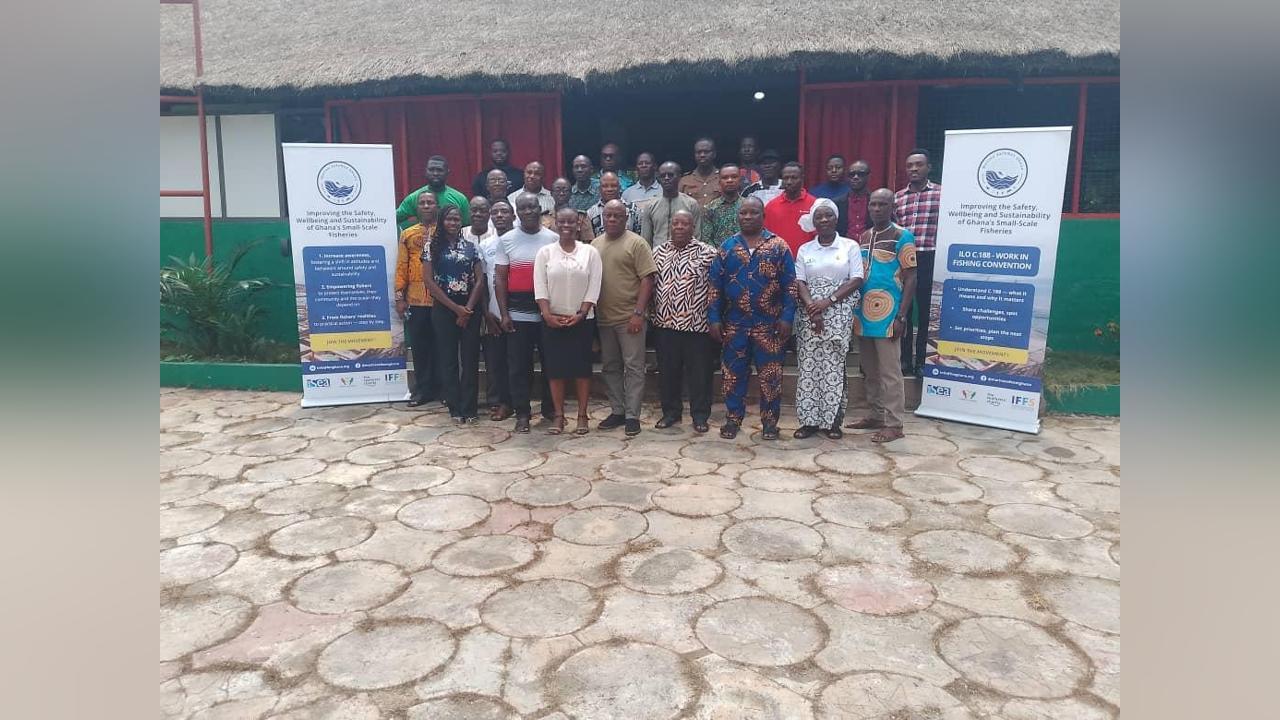Africa-Press – Ghana. Friends of the Nation ( FoN), in partnership with Pro Sea Marine Education, a Dutch non-government organisation (NGO) under the Marine Safe Net Ghana project, has organised a day’s validation safety training workshop for fishers and other stakeholders in the fishing industry.
The training module, which is being piloted in the Shama, Dixcove and Axim district, in the Western Region, is being sponsored by The International Fund for Fishing Safety (IFFS).
The training was on the theme: “Improving the Safety, Well-Being and Sustainability of Small-Scale Fisheries in Ghana. “
The training follows global safety standards like the International Labour Organization work in fishing convention, which sought to protect fishers worldwide.
Speaking at the training, at Adiembra, Mr Mevuta Donkris, Executive Director of the FoN, said the training marked “a step forward in building safer, healthier and more sustainable small-scale Fisheries in Ghana.”
The meeting drew participants from the Ghana National Canoe Fishermen Council (GNCFC), the Canoe Owners and Gear Operators Association of Ghana ( CaFGOAG), the National Fish Processors and Traders Association (NAFPTA) and the Canoe Crew.
The rest are state agencies such as the Ghana Maritime Authority (GMA), Fisheries Commission (FC), Ghana Ports and Harbour Authority (GAPOHA) and the Ghana National Fire Service (GNFS).
The training sought to review together a draft training module- not something done for fishers, but something done with fishers.
The Executive Director said: “Training safety for fishers matters because fishing is one of the most dangerous jobs in the world.”
Citing a report from the Food and Agricultural Organisation, the International Labour Organisation, in 2022, Mr Donkris said about 88 fishers lose their lives at sea every day amounting to over 32,000 every year with each number representing a family member who did not return home.
Mr Donkris said: “It is because of these risks and struggles fishers face every day which called for the training to stand together and say loud and clear: safety first. Safety always. Safety- it’s all about you.”
The Executive Director said safety was not just about rules and equipment but about responsibilities.
In this regard, Chief fishermen are expected to lead safe practices at the landing beaches.
Canoe Owners must ensure safe canoes and supporting crew safety with fishers taking personal responsibility for safe practices at sea.
The Executive Director reminded participants to take the training as a stepping stone towards a long-term behavioural change so that every canoe returned safely, every crew member comes home alive and family is protected.
He reminded the fishers to follow the one simple principle: Nothing for fishers without fishers by working together to shape a training that protects their lives and livelihood.
Nana Jojo Solomon, President of the National Fisheries Association of Ghana (NAFAG) reminded the fishers that prior to technology, they used the traditional mode of fishing and advised them to embrace them in case modern technology failed.
He said as part of safety measures on the sea, fishers required First Aid Boxes in canoes to treat casualties.
Nana Jojo Solomon, who is also the President of Canoe Council of Ghana, noted that incidents of fire outbreaks in the sea called for fire extinguishers for fishers.
In addition, fishers also required life-saving jackets to make them stay afloat on the sea in terms of sea hazards.
Mr Kenneth Atta, General Secretary of Canoe and Fishing Gear Owners Association of Ghana said artisanal fishers in Ghana suffered a lot of atrocities and fatal accidents on sea many of which were not recorded.
He said it was high time they developed mechanisms of reporting some of those incidents of the various landing beaches.
Mr Kenneth Atta, who is also the National Chairman of Small Pelagic of the Fisheries Commission, said besides people losing their lives, properties were lost through fatal accidents and damages through nature and climate change.
Mr Kenneth Atta asked fishers to be guided by decisions taken at the workshop such as keeping records before setting off at sea for fishing expeditions to keep track of their crew on board.
He said it was relevant for fishers to adopt safety measures to handle pre-mix fuel at sea.
A Project Officer with FoN, Mr Eric Atsiatorme in a presentation, identified community safety and responsible reporting mechanisms to a holistic fishing.
He stressed the need to deepen understanding the marine environment and how the sea worked, adding that fisher must possess knowledge about weather conditions.
Mr Atsiatorme also advised fishers to be adaptive to climate change issues.
For More News And Analysis About Ghana Follow Africa-Press







